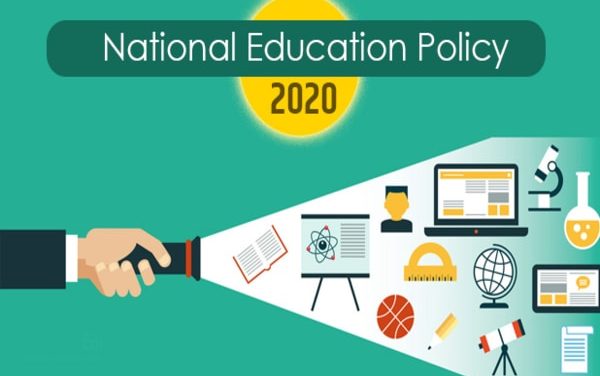New Education Policy 2020: A Much Awaited Reform in Indian Education Sector
 The New Education Policy was launched on July 29. Approved by the Union cabinet, the policy aims to overhaul the country’s education system. Union Ministers for Information and Broadcasting (I&B) Prakash Javadekar and Human Resource Development (HRD) and Ramesh Pokhriyal Nishank, made this announcement. In a reforms, seen as the most ambitious since the introduction of the 10+2+3 system, the National Education Policy restructures school education by setting out age 3-6 years as pre-school, de-emphasises “high stakes” boards, introduces a SAT-like university entrance test and offers the option of a four-year bachelor’s degree at the undergraduate level.
The New Education Policy was launched on July 29. Approved by the Union cabinet, the policy aims to overhaul the country’s education system. Union Ministers for Information and Broadcasting (I&B) Prakash Javadekar and Human Resource Development (HRD) and Ramesh Pokhriyal Nishank, made this announcement. In a reforms, seen as the most ambitious since the introduction of the 10+2+3 system, the National Education Policy restructures school education by setting out age 3-6 years as pre-school, de-emphasises “high stakes” boards, introduces a SAT-like university entrance test and offers the option of a four-year bachelor’s degree at the undergraduate level.
Changes have been made in the board structure as well which will seek to make the exams a test of ‘core competencies’ rather than just theoretical knowledge and this will be implemented from the 2021 academic session. The new university entrance test will be implemented for college admissions in the 2022 academic session. NEP also aims to provide students with increased flexibility and subjects and there will be no rigid separation between arts and sciences, curricular and extra-curricular activities, etc, the government said. Also, by 2025, at least 50% of learners through the school and higher education system shall have exposure to vocational education.
Highlights of the New Policy:
- The 10+2 system will now be divided into 5+3+3+4 format
- There is no rigid separation between the Science and Arts stream
- Key emphasis will be on the students adept in at least one skill
- Inclusive & Equitable Education System by 2030
- Board exams will be low stakes & test actual knowledge instead of rote learning
- Mother tongue to be a medium of instruction till 5th grade
- Report cards will be a comprehensive report on skills and capabilities instead of just marks and statements
- Curriculum to integrate 21st Century Skills, Mathematical Thinking and Scientific temper
- Gender Inclusion Fund
- e-Content in Regional Language
- Emphasis on Digitally Equipping, School, Teachers and Students
- NTA to offer Common Entrance Exam for Admission TO HEIs
- The Cabinet has also accepted the puposal of changing name of MHRD to Education Ministry.
What Industy Experts Comment
Prof Mahadeo Jaiswal, Director, IIM Sambalpur
“We welcome the move made by The Cabinet to rename the HRD ministry to the Education ministry as the role of the department is to further and provide education. Allowing global institutes to set up campuses in India is also a positive move as it will increase competition because it will open up our education system and it will also help sustain high talent in the country as students don’t have to move out to pursue education. Changing the pedagogical structure from a 10+2 system to a 5+3+3+4 system is in line with international educational standards. Due to the small structure of our IIMs and IITs, despite having ample talent, they were unable to figure in top 100 institutes of the world. Allowing technical institutes to become multi-disciplinary will help IIMs and IITs to start other departments like medical etc and make their size bigger and allow them to admit more students. This will enable them to compete with the elite institutes of the world and become at par with them in the coming years. Diversification makes education more complete and helps increase intellectual outcome. Overall, the changes have been made according to the global system of education. This will also help attract foreign students to India and help the economy as well.”
BVR Mohan Reddy, Executive Chairman Cyient and Chairman of Board of Governors, IIT Hyderabad
“Technology and globalization have turned countries into knowledge–driven economies. They are radically accelerating the pace of change in the world and raising the long-term risks. Success in knowledge-driven and innovation-driven world order depends largely on the capabilities of the people, and education, both school and higher education, is the key to building the requisite capabilities.
In this context, I believe the National Education Policy 2020 approved by the Union Cabinet today is a watershed moment for Indian education. Large scale, transformational reforms in school and higher education are the need of the hour. The policy presents several forward-looking initiatives for universal access of education, and paves way for high student-inclusion.
The National Education Policy 2020 envisages multidisciplinary courses, multiple entry/exit points, LASE curriculum, credit-transfer, flexible learning and this augurs well to make technical education more holistic and future-ready. This is also in line with the spirit of the recommendations put forward by the AICTE Committee for Preparing Short and Medium-term Perspective Plan for Engineering Education in 2018. The entry of top foreign universities will give a good thrust to higher education on par with global standards. Overall, a forward-looking policy. I wish the implementation is meticulously chalked out and is executed in a time-bound manner.”
Dr Jitin Chadha, Founder & Director, Indian School of Business & Finance (ISBF)
"The approval of a new education policy, after over three decades, is certainly a welcome development. Given the centrality of education in nation-building, we certainly think this will help focus efforts in future. The Draft NEP released by the government earlier talked about various reforms in Indian higher education, and we firmly believe that in higher education, none are as important as providing impetus and a seamless path to forging effective collaborations between Indian institutions and their global counterparts. This will enable us to create the highest possible quality of human capital, which will be a necessary and key differentiator in the post-COVID world where labour markets will become flatter than ever before."
Col. (Retd.) Gopal Karunakaran, CEO, Shiv Nadar School on the New Education Policy
“We congratulate the Government for formulating a forward-looking, inclusive policy that will go a long way towards creating an equitable and vibrant knowledge society. It signals the Government’s intent to implement sweeping reforms in the education system. The stated aim to provide foundational literacy and numeracy skills to all Indians in the next five years is laudable and will help India shed the stigma of illiteracy. The policy has many positive aspects, such as free and compulsory education for students, reintegrating school dropouts into the education system and the emphasis on mother tongue, classical languages and physical skills. All this was long-overdue.”

